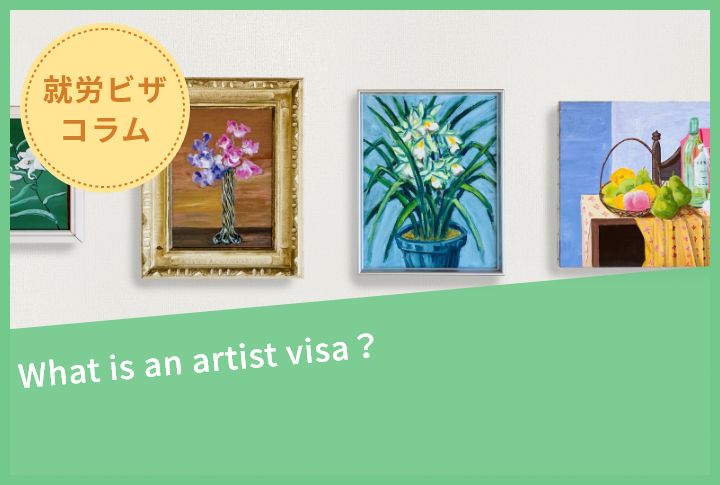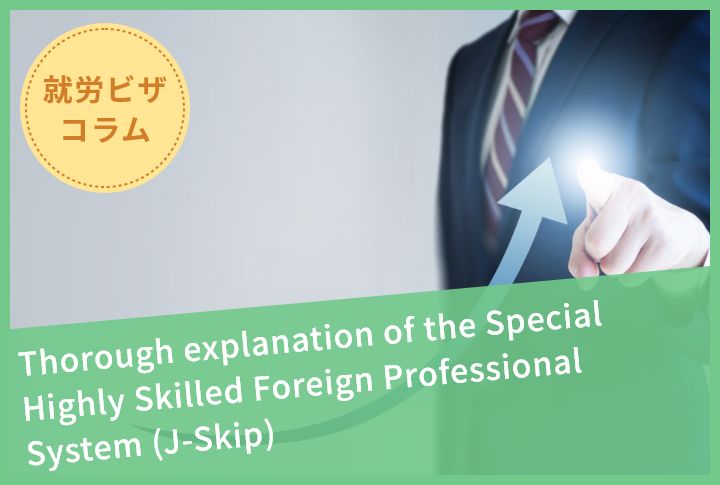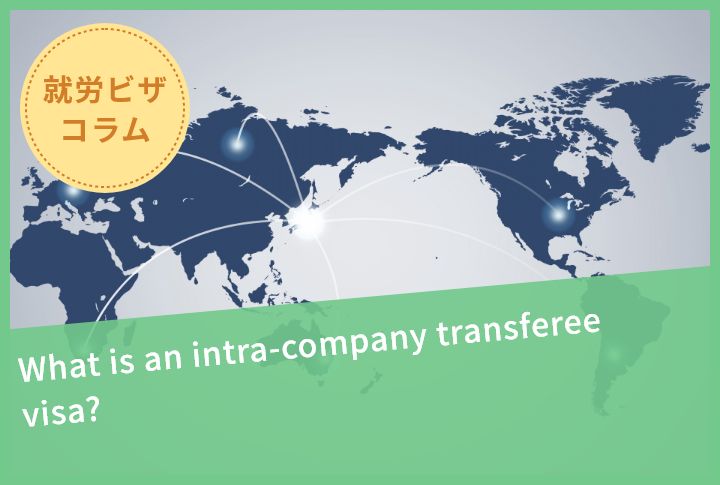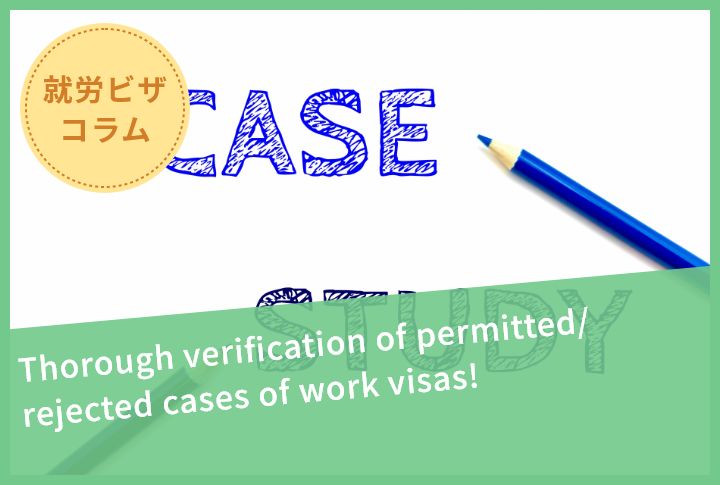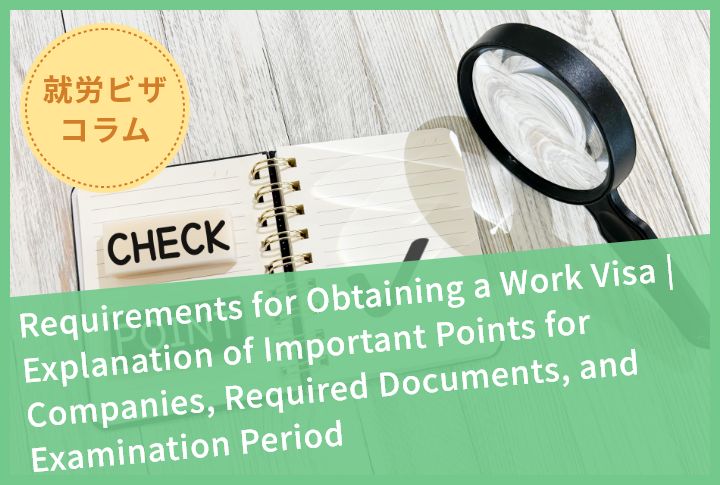Procedure to change from a student visa to a work visa
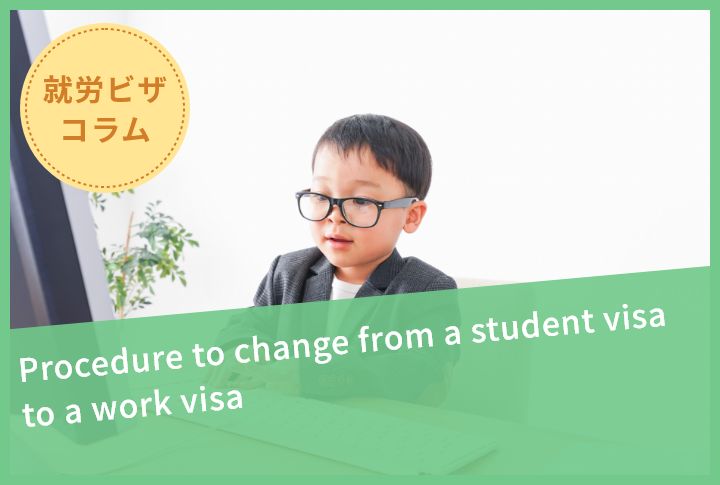
In this article, for international students and HR personnel of companies hiring international students, our administrative scriveners will explain the procedure for changing from a student visa to a work visa.
We will explain the points to note based on the “Guidelines for permission to change the status of residence of international students to ‘Engineer/Specialist in Humanities/International Services’” (established in February 2015 and revised in December 2019) published by the Immigration Services Agency.
Please use this article as a reference for change from a student visa to a work visa.
Index
1. Requirements for changing from a student visa to a work visa
The requirements for the change from a student visa to a work visa are: (1) being eligible for each status of residence, (2) conformity with the Ministerial Ordinance on Criteria for Landing Permission, (3) behaviors not being bad, and (4) submission of notifications provided in the Immigration Act.
Let’s check the above requirements one by one.
(1) Being eligible for each status of residence
Work visas are categorized by contents of activities in the Immigration Act, so the type of visa you need to obtain differs depending on your job. For example, “Engineer/Specialist in Humanities/International Services” if you work as an interpreter, “Skilled Labor” if you work as a chef, “Instructor” if you work as a high school teacher, and so on.
Work visas cannot be obtained for jobs that do not fall under any activity category provided in the Immigration Act.
In other words, if you get a job that falls under any of the activities provided in the Immigration Act, you have an eligibility for the status of residence. Conversely, if you get a job that does not belong to any of the activities in the Immigration Act, you have no eligibility for status of residence.
(2) Conformity with the Ministerial Ordinance on Criteria for Landing Permission
The Criteria for Landing Permission are the requirements stipulated in an ordinance of the Ministry of Justice, in addition to the requirement concerning eligibility of the status of residence as described in (1) above. The Criteria sets requirements related to activities that need to be adjusted in light of immigration policy, considering the influence on the economy and people’s lives.
Specifically, the Criteria include requirements on educational background, work history, and qualifications.
(3) Behaviors not being bad
One of the requirements for the change from a student visa to a work visa is that the applicant’s behaviors are not bad.
How does immigration officers judge whether the behaviors of international students are good or bad?
Let’s check out the typical factors that are negatively evaluated in the examination concerning the change from a student visa to a work visa.
The first one is about a part-time job.
The major points are: (1) Observance of the hours of part-time job (within 28 hours per week (or within 8 hours per day during long-term closure of educational institutions)), (2) appropriate contents of part-time jobs (in relation to the Act on Control and Improvement of Amusement Business, etc., and jobs which may hinder activities as an international student), and (3) acquirement of permission for part-time jobs (called permission to engage in activity other than that permitted under the status of residence previously granted).
When changing from a student visa to a work visa, the immigration officers will confirm the status of part-time jobs during school years to check the fulfillment of the requirement concerning behaviors, so international students must observe 3 points: observance of the limitation of hours for part-time jobs, appropriateness of contents of the part time jobs, and acquisition of permission to work part time.
If you are in charge of human resources at a company, please try to prevent unexpected rejection by checking the 3 points at the interview: observance of the limitation of hours for part-time jobs, appropriateness of contents of the part time jobs, and acquisition of permission to work part time.
The second one is the status of enrollment until the time of application.
For example, this one becomes an issue when you graduate from a vocational school in Japan and apply to change your visa to a work visa, but your participation rate is not high.
When applying for the change from a student visa to a work visa, the details of your activities up to the time of application (i.e. the content of your activities as an international student) will also be subject to examination, so please be careful if you are an international students.
The third one is when there is a criminal record.
This is not an issue if you comply with laws every day, but recently, cases in which international students are unintentionally involved in crimes are increasing.
For example, you may face an unexpected trouble later if you have a part-time job which requires you to only receive a luggage at your home, or if you easily lend your residence card to someone else.
International students should observe Japanese laws and stay aware of their positions as international students.
(4) Submission of notifications provided in the Immigration Act
It is required to fulfill obligations to submit notifications stipulated in Articles 19-7 through 19-13, Article 19-15 and Article 19-16 of the Immigration Act.
The specific items are listed below, so please make sure to understand what kind of notifications are required in what cases, and submit notifications within each period specified by the Immigration Act.
Article 19-7 (Notification of the Place of Residence Following a New Landing)
Article 19-8 (Notification of the Place of Residence Associated with a Change of Status of Residence)
Article 19-9 (Notification of Change of the Place of Residence)
Article 19-10 (Notification of Change of an Entry Other than the Place of Residence)
Article 19-11 (Extension of the Validity Period of the Residence Card)
Article 19-12 (Reissuance of the Residence Card Due to Loss)
Article 19-13 (Reissuance of the Residence Card Due to Defacement)
Article 19-15 (Return of the Residence Card)
Article 19-16 (Notification Relating to the Organization of Affiliation)
2. Summary of procedures for changing from a student visa to a work visa
In this article, we have explained the requirements for changing from a student visa to a work visa (Engineer/Specialist in Humanities/International Services).
According to the data released by the Ministry of Justice on October 10, 2018, the permission rate for the change from a student visa to a work visa is 80.3%. Unfortunately, even in the current shortage of human resources, 1 person in every 5 international students who have applied for the change to a work visa is rejected.
Daiichi-Sogo Group is the only administrative scrivener corporation in Japan that participates in the consortium organization for “Program for Enhancing Employment of International Students” provided by the Ministry of Education, Culture, Sports, Science and Technology for the expansion of employment of international students by Japanese companies.
We will continue to actively support employment of international students, so please feel free to contact us if you are in charge of human resources and consider hiring international students, or if you are an international student and have problems with your work visa.
(For reference)
The “Program for Enhancing Employment of International Students” is led by the Ministry of Education, Culture, Sports, Science and Technology. In the program, each university collaborates with local governments and industry worlds for “expansion of the employment of foreign human resources by Japanese companies,” stated in the growth strategy, by supporting to create an environment for integral learning concerning “business Japanese,” “career education and business culture in Japan,” and “mid- & long-term internships.” This program aims at the settlement of foreign students in Japan, as well as the enhancement of attractiveness of studying in Japan for the eventual increase of international students in Japan.








